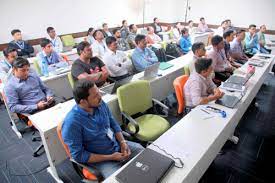The Power of Great Learning
Learning is a lifelong journey that shapes our understanding, skills, and perspectives. Great learning goes beyond acquiring knowledge; it transforms individuals, empowers communities, and drives progress.
Empowering Individuals
Great learning equips individuals with the tools they need to navigate the complexities of the world. It fosters critical thinking, creativity, and adaptability, enabling people to embrace challenges and seize opportunities.
Fostering Innovation
By fostering a culture of continuous learning and improvement, great learning fuels innovation. It encourages experimentation, collaboration, and risk-taking, leading to breakthroughs in technology, science, and the arts.
Building Strong Communities
Communities built on a foundation of great learning are resilient and inclusive. They value diversity, promote equality of opportunity, and support lifelong education for all members. Such communities thrive on shared knowledge and mutual respect.
Driving Progress
Great learning is a catalyst for progress in society. It enables individuals to address pressing challenges such as climate change, inequality, and healthcare disparities. By empowering people with the skills and knowledge they need, great learning paves the way for a brighter future.
Celebrating Achievement
As we celebrate the power of great learning, let us recognise the achievements of those who have dedicated themselves to expanding their horizons. Their commitment to growth not only benefits themselves but also enriches the world around them.
Understanding the Vital Role of Lifelong Learning: Key Questions and Insights
- What is the importance of lifelong learning?
- How does continuous learning benefit individuals?
- What are the advantages of acquiring new skills and knowledge?
- How can education empower communities?
- In what ways does learning contribute to personal growth and development?
- What role does innovation play in the context of lifelong learning?
What is the importance of lifelong learning?
Understanding the importance of lifelong learning is crucial in today’s fast-paced and ever-changing world. Lifelong learning allows individuals to adapt to new challenges, acquire new skills, and stay relevant in their fields. It fosters personal growth, enhances career prospects, and promotes continuous self-improvement. By embracing lifelong learning, individuals can expand their horizons, stay curious and engaged, and contribute meaningfully to society. In essence, lifelong learning is not just a choice but a necessity for personal fulfilment and professional success in an increasingly dynamic global landscape.
How does continuous learning benefit individuals?
Continuous learning benefits individuals in numerous ways. By engaging in ongoing education and skill development, individuals stay relevant in a rapidly evolving world. It allows them to adapt to new technologies, trends, and challenges, enhancing their problem-solving abilities and critical thinking skills. Continuous learning also boosts confidence and self-esteem, as individuals gain a sense of accomplishment and mastery over new subjects. Furthermore, it opens up opportunities for career advancement, personal growth, and overall fulfilment. Embracing continuous learning not only expands knowledge but also broadens perspectives and enriches lives in meaningful ways.
What are the advantages of acquiring new skills and knowledge?
Acquiring new skills and knowledge offers a multitude of advantages that enrich both personal and professional growth. By expanding one’s skill set, individuals enhance their adaptability and versatility, enabling them to tackle challenges with confidence and creativity. Additionally, acquiring new knowledge opens doors to opportunities for career advancement, as it demonstrates a commitment to continuous learning and self-improvement. Moreover, the process of acquiring new skills can boost self-esteem and motivation, fostering a sense of accomplishment and fulfilment. Ultimately, investing in learning not only broadens horizons but also equips individuals with the tools needed to navigate an ever-evolving world successfully.
How can education empower communities?
Education has the transformative power to empower communities in profound ways. By providing access to quality education, communities can equip individuals with the knowledge and skills needed to thrive economically, socially, and culturally. Education fosters a sense of unity and collaboration within communities, promoting inclusivity and understanding among diverse members. It empowers individuals to become active participants in shaping their community’s future, driving innovation, progress, and sustainable development. Ultimately, education serves as a catalyst for positive change, enabling communities to overcome challenges and build a brighter, more prosperous tomorrow.
In what ways does learning contribute to personal growth and development?
Learning plays a pivotal role in fostering personal growth and development in numerous ways. By acquiring new knowledge and skills, individuals expand their understanding of the world and enhance their problem-solving abilities. Through learning, people gain confidence in their capabilities, which boosts self-esteem and resilience in the face of challenges. Furthermore, continuous learning encourages individuals to adapt to change, embrace innovation, and explore new opportunities for personal advancement. Ultimately, learning serves as a catalyst for self-improvement, empowering individuals to reach their full potential and lead fulfilling lives.
What role does innovation play in the context of lifelong learning?
In the context of lifelong learning, innovation plays a pivotal role in driving continuous growth and development. Innovation sparks creativity, encourages exploration of new ideas and approaches, and challenges individuals to think outside the box. By embracing innovation, lifelong learners can adapt to changing environments, seize opportunities for personal and professional advancement, and contribute meaningfully to their communities. It fosters a culture of curiosity and experimentation that propels individuals towards ongoing self-improvement and discovery, making innovation an essential component of lifelong learning journeys.
